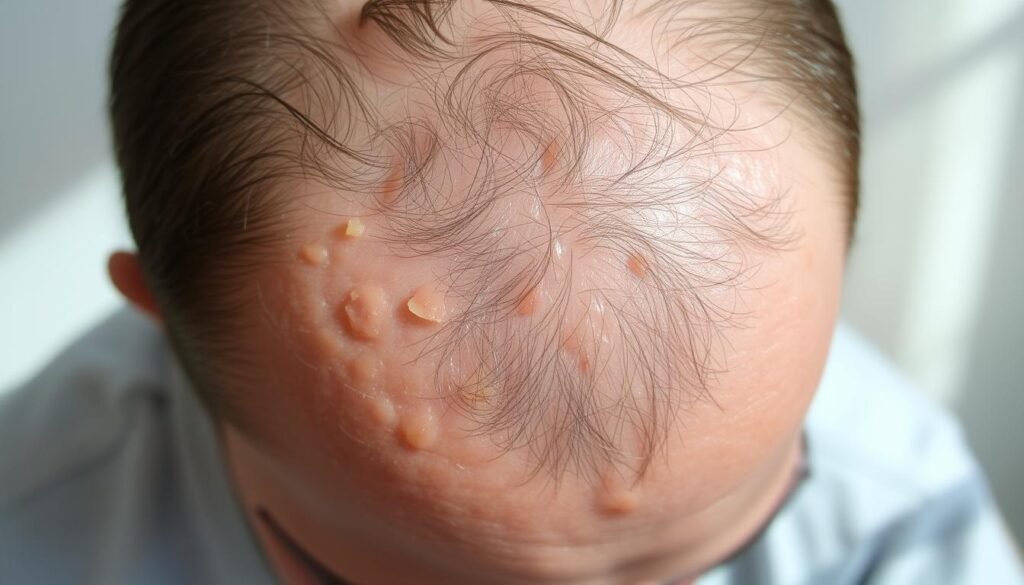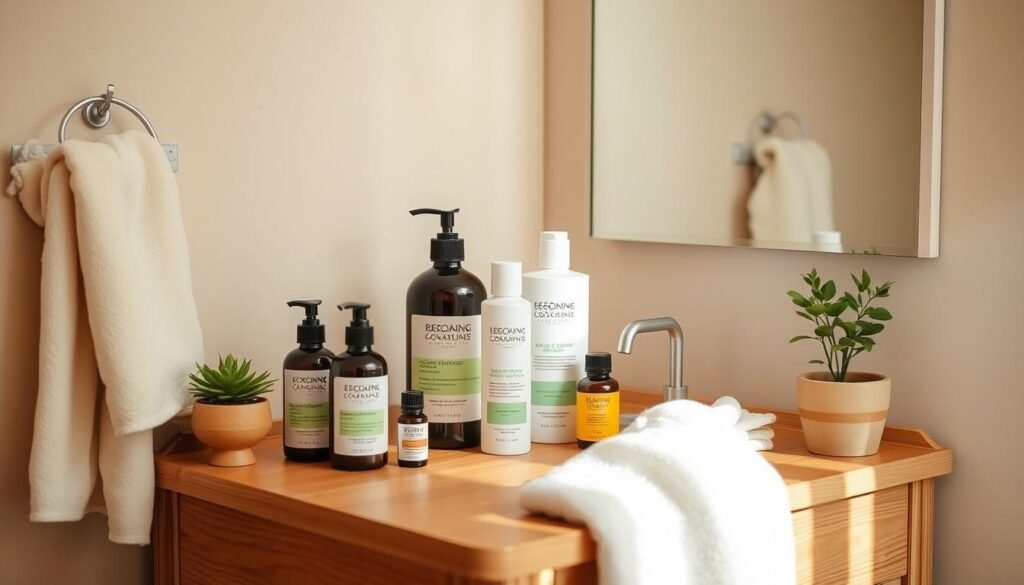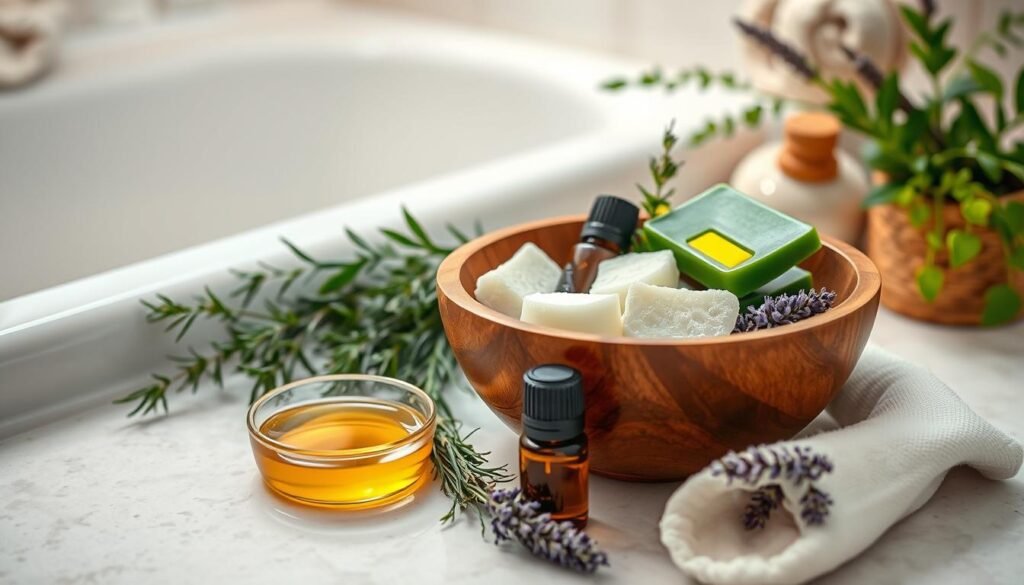
A dry, flaky scalp can be really annoying and uncomfortable. But, with the right steps, you can keep your scalp healthy and moist. This guide will share tips from experts to help you manage and prevent dry scalp.
Dry scalp can come from many things like weather changes, product buildup, and health issues. Knowing the causes and using the right hair care can fix your scalp problems. This way, you can get lasting relief.
Key Takeaways
- Dry scalp can lead to itchiness, flakiness, and even hair loss if left untreated
- Expert tips and natural solutions can help prevent and manage dry scalp
- Understanding the causes of dry scalp is crucial for developing an effective treatment plan
- A balanced hair care routine, including the right products and scalp treatments, can maintain scalp health
- Addressing underlying medical conditions and making dietary changes can also improve scalp hydration
What Causes Dry Scalp?
Dry scalp can be a frustrating problem. It often comes from environmental factors and how we groom ourselves. Changes in weather and climate are big culprits. Extreme temperatures and low humidity dry out the scalp, causing itchiness and flaking.
But it’s not just the weather. Too much sun can harm the scalp’s skin. Also, using harsh shampoos too often can dry out the scalp.
Weather Changes and Environmental Factors
- Fluctuations in temperature, both hot and cold
- Low humidity levels that strip the scalp of natural oils
- Prolonged exposure to the sun, which can damage the skin’s barrier
- Harsh hair care products that strip the scalp of its essential moisture
Underlying skin conditions like eczema or psoriasis can also cause dry scalp. In these cases, the scalp needs special care to manage the issue.
“Maintaining a healthy scalp is essential for achieving vibrant, strong hair. By understanding the various factors that can lead to dryness, you can take proactive steps to keep your scalp in optimal condition.”
Hair Care Routine and Products
Keeping your hair care routine right is key for a healthy scalp. The right products and methods can make a big difference. Too much shampooing, alcohol in styling products, and buildup can dry out your scalp. Use gentle, sulfate-free shampoos and moisturizing conditioners to help.
Adding scalp-friendly ingredients like coconut oil, tea tree oil, and aloe vera can help. A scalp massage can also loosen buildup and add volume. A balanced hair care routine keeps your scalp healthy and promotes hair growth.
Pre-Shampoo Treatments
Pre-shampoo treatments can deeply nourish your scalp. They hydrate in just fifteen minutes, getting your scalp ready for shampoo.
Exfoliating Shampoos
Exfoliating shampoos help balance your scalp and remove buildup. They have gentle ingredients that control oil and refresh your scalp.
Post-Shower Scalp Tonics
Using a soothing tonic after showering hydrates and calms your scalp. It adds extra nourishment and protection.
Sticking to a hair care routine that focuses on scalp health is vital. By using these products and methods, you can keep your scalp balanced and enjoy healthy, vibrant hair.

Medical Conditions and Skin Disorders
Some medical conditions and skin disorders can make your scalp dry and flaky. Eczema, psoriasis, and seborrheic dermatitis can cause inflammation, dryness, and dandruff on the scalp. Seeing a dermatologist is key to find the cause and get the right treatment. This might include special shampoos, creams, or pills.
Other medical issues that can make your scalp dry include:
- Seborrheic dermatitis, which causes scaly, itchy patches on the scalp and other oily areas of the body.
- Ringworm, a fungal infection that can lead to circular, flaky patches on the scalp.
- Folliculitis, which occurs when hair follicles become inflamed, often due to bacterial infection.
- Lichen planus, an inflammatory skin condition that can cause purple, itchy rashes on the scalp.
- Malnutrition, which can lead to dry, brittle hair and scalp issues.
It’s vital to tackle any underlying medical issues to treat and prevent a dry, flaky scalp. Getting professional advice is crucial for the right diagnosis and treatment plan.
“Proper diagnosis and treatment of any medical conditions contributing to a dry scalp is crucial for long-term relief and healthy hair and skin.”
How to Treat Dry Scalp Naturally
If you have a dry, irritated scalp, there are natural remedies you can try at home. Coconut oil and tea tree oil are great for treating dry scalp issues.
Coconut Oil for Dry Scalp
Coconut oil is a great moisturizer for a dry scalp. It’s full of fatty acids that soothe and nourish the skin. This helps keep it hydrated.
Just apply a small amount of coconut oil to your scalp, massage it in, and let it sit for 30 minutes to an hour. Rinse it off. Do this a few times a week to keep your scalp healthy.
Tea Tree Oil for Dry Scalp
Tea tree oil is also good for a dry, irritated scalp. It has antimicrobial and anti-inflammatory properties. This helps with fungal overgrowth or skin inflammation.
Dilute a few drops of tea tree oil in coconut or jojoba oil. Then, massage it into your scalp. Leave it on for 10-15 minutes before rinsing.
You can also use apple cider vinegar, aloe vera, and baking soda in your scalp treatment routine. Always do a patch test before trying a new ingredient. If your symptoms don’t get better, talk to a healthcare professional.

Scalp Exfoliation and Massages
Keeping your scalp healthy is key for great hair. Scalp exfoliation and massages help a lot. They remove old skin and oil, and boost blood flow.
Scalp exfoliation uses scrubs or chemicals to clean your scalp. It’s good for dandruff and oily hair. But don’t scrub too hard, or you might make your scalp oilier.
Scalp massages are also great for your scalp. They improve blood flow and clean the skin. This makes your scalp healthier and less itchy.
| Scalp Exfoliation Products | Scalp Massage Benefits |
|---|---|
| L’Oreal Paris EverFresh Micro-Exfoliating Scrub | Increased blood flow |
| dpHUE Apple Cider Vinegar Scalp Scrub | Reduced itching and flakiness |
| Christophe Robin Cleansing Purifying Scrub with Sea Salt | Improved oil production management |
| R + Co Crown Scalp Scrub | Overall scalp health enhancement |
Adding scalp exfoliation and massages to your routine helps a lot. It fights dry scalp and makes your hair healthy. Taking care of your scalp leads to shiny, beautiful hair.
Professional Treatments and Medications
If home remedies and over-the-counter products don’t help, it’s time to see a doctor. Dermatologists can give you medicated shampoos with ingredients like salicylic acid or selenium sulfide. These are for conditions like seborrheic dermatitis or. For serious cases, they might suggest topical or oral meds to fix the root cause.
About eight million people in the U.S. have psoriasis, a chronic skin issue that can make your scalp dry and flaky. Actinic keratosis, a skin growth that could turn cancerous, is more common in men with hair loss. It’s also seen in people over 50 who spend a lot of time outside without sunscreen. Tinea capitis, a scalp fungus, spreads easily through contact with others and animals. Both psoriasis and atopic dermatitis can make your scalp dry and itchy.
Prescription Medications for Dry Scalp
- Prescription-strength medicated shampoos with salicylic acid or selenium sulfide can tackle tough cases of seborrheic dermatitis or psoriasis.
- Topical corticosteroids or calcineurin inhibitors can help reduce inflammation and itching.
- Oral antifungal meds are for fungal infections like tinea capitis that make your scalp dry and scaly.
If OTC solutions don’t work, see a dermatologist. They can find the cause and create a treatment plan. With the right help and meds, you can get a healthy, moist scalp.

“The Gisou Honey-Infused Scalp Treatment Serum received positive feedback from a reviewer stating that after the first use, the scalp felt moisturized with no flakes.”
How to prevent dry scalp
Keeping your scalp healthy and hydrated is key for shiny, vibrant hair. There are many ways to stop dry scalp and keep it healthy. Adjusting your hair care and using nourishing treatments are good steps.
Limit Frequent Washing
Washing your hair too much can dry out your scalp. Try to wash it 2-3 times a week. Use gentle, moisturizing products to keep your scalp moist.
Avoid Harsh Chemicals and Irritants
Stay away from hair products with alcohol, fragrances, or harsh chemicals. They can make your scalp dry and itchy. Choose scalp-friendly hair care that moisturizes your scalp.
Protect from Sun Exposure
The sun can dry out your scalp, making it flaky and uncomfortable. Wear a hat or scarf outside to protect your scalp from the sun.
Incorporate Scalp Treatments
- Massage your scalp with nourishing oils like coconut or argan oil to add moisture and calm dryness.
- Use a scalp serum or hair mask with hydrating ingredients for deep conditioning.
- Exfoliate your scalp often to remove dead skin cells and encourage healthy cell growth.
By following these tips, you can prevent dry scalp and keep your scalp healthy. This is important for beautiful, vibrant hair. Remember, fixing scalp dryness is the first step to a healthy scalp.
Hydration and Dietary Considerations
Drinking enough water and eating a healthy diet are key to a healthy scalp. An adequate amount of water keeps your skin, including your scalp, hydrated. Eating healthy fats like those in avocados, nuts, and fish helps your skin and scalp stay healthy.
Drinking Enough Water and Healthy Fats
Drinking lots of water helps avoid washing away your scalp’s natural oils. Use moisturizing shampoos for dry or sensitive scalps. Ingredients like aloe vera and coconut oil are good choices.
Excessive heat styling can dry out your scalp and hair. Limit hot tool use and do scalp massages to improve blood flow and hair growth.
Eating healthy fats is also important. Omega-3 fatty acids in fatty fish, walnuts, and flax are great for your skin and scalp. Biotin, or vitamin B-7, helps with fatty acid metabolism and is found in liver, yeast, and eggs.

By focusing on hydration and a diet rich in healthy fats, you can fight dry scalp. A balanced approach to scalp and skin health is essential for a healthy, radiant look.
Scalp Serums and Oils
Adding scalp serums and oils to your hair care can help a lot. They add moisture and nourishment to a dry scalp. Jojoba, argan, and rosemary oils can calm inflammation and strengthen the scalp skin.
These treatments work well with other remedies for a dry scalp. They help keep your scalp healthy and itch-free.
When picking a scalp serum or oil, think about your hair type and scalp issues. Pattern Beauty Scalp Serum is good for textured hair, Divi Scalp Serum for dandruff, and Ouai Scalp Serum for dry scalps. Choose ones without harsh chemicals like parabens and sulfates.
Also, exfoliating your scalp regularly is key. It removes dirt, oils, and flaky skin. Use a product like the Straand exfoliating scalp scrubber or Nutrafol Exfoliating Scalp Mask for a healthier scalp.
“Keeping the scalp healthy is essential for maintaining strong, vibrant hair. Incorporating nourishing scalp serums and oils into your routine can make a significant difference in combating dryness and irritation.”
For a full scalp care routine, try products like the SheMoisture Hydrating Scalp Mask, The Ordinary Hydrating Scalp Serum, and Briogeo Charcoal and Tea Tree Oil Scalp Detox. They balance the scalp’s pH, soothe inflammation, and support hair growth.
Keeping your scalp healthy is key for your hair’s health and look. Using the right scalp serums and oils can nourish your scalp, reduce dryness, and promote strong hair growth.
Managing Stress and Hormonal Changes
Keeping your scalp healthy can be tough. Stress and hormonal changes can really affect it. Hormones help make the oils that keep your hair moist. But, when they’re off, you might get too much oil and dandruff.
Puberty and other hormonal shifts can make you produce more oil. This can lead to scalp problems. Using special shampoos with selenium sulfide can help fight dandruff for up to 7 days.
Stress can weaken your immune system. This lets dandruff-causing microbes grow. It also makes your scalp itchier, oilier, and can even cause hair loss. To fight this, try stress-reducing activities like meditation and deep breathing.
Eating more fruits and veggies is key for scalp and hair health. Cutting down on red meats, sodium, caffeine, and sugar also helps. These changes can make your scalp healthier.
By tackling stress and hormonal issues, you can keep your scalp in good shape. Adding scalp-friendly products and getting advice from trichologists can help a lot. This way, you can manage stress and hormonal changes for a healthier scalp.
| Lifestyle Factors for Scalp Health | Recommended Actions |
|---|---|
| Stress Management |
|
| Hormonal Balance |
|

“Managing stress and hormonal fluctuations is crucial for maintaining a healthy scalp and promoting overall hair well-being.”
Scalp-Friendly Hair Care Products
Choosing the right hair care products is key to a healthy scalp. Stay away from harsh ingredients like sulfates, alcohols, and fragrances. These can dry out your scalp. Instead, pick gentle scalp-friendly hair products with ingredients like aloe vera, coconut oil, and chamomile.
Maria Nila is known for their scalp-friendly hair care. Their Head & Hair Heal line includes shampoo, conditioner, treatment, and mask. These products are winners of awards like the Harper’s Bazaar Hair Award Winner 2023, Allure Best of Beauty Award Winner 2022, and Byrdie Eco Award Winner 2022.
- The Head & Hair Heal Shampoo gently cleanses your scalp and hair. The Conditioner hydrates and nourishes.
- The Hair Treatment and Masque offer deep conditioning and moisturizing. The Masque is good for sensitive skin and should be left in for 5-10 minutes.
Using scalp-friendly hair products can keep your scalp healthy. Avoiding irritating ingredients and product buildup is important. Maria Nila’s Head & Hair Heal collection is a top choice. It has won many awards for its effectiveness in scalp care.
“Maria Nila’s Head & Hair Heal collection is a game-changer for those dealing with dry, sensitive scalps. The products have transformed my hair and scalp, leaving it nourished, balanced, and healthier than ever.”
Conclusion
Keeping your scalp healthy is key for hair growth and avoiding flakes. This guide offers expert tips to prevent and treat dry scalp. It helps restore balance to your scalp.
Using sulfate-free shampoos and deep conditioning treatments is important. Natural remedies like coconut oil and tea tree oil also help. Regular scalp exfoliation and massages are crucial too.
A healthy scalp is vital for great hair. Make it a top priority in your hair care. Follow Dr. Camille Howard-Verovic’s advice and the solutions in this article. Start your journey to a flake-free, confident look and better hair wellness.
